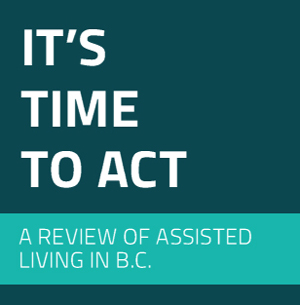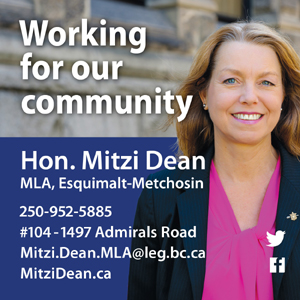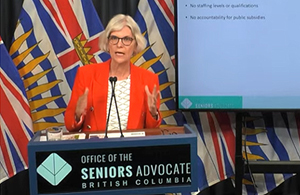
Wednesday June 28, 2023 | VICTORIA, BC
by Mary P Brooke | Island Social Trends
The BC Seniors Advocate Isolbel Mackenzie has released a review of assisted living and is calling on government to address the current confusing legislative landscape to protect seniors from significant rent and service fee increases, improve oversight and reporting, and address affordability challenges by increasing the number of publicly subsidized assisted living units.
Mackenzie held a media announcement today at the BC Legislative Press Gallery in Victoria including the rollout of five recommendations. The Office of the BC Seniors Advocate released their presentation “It’s Time to Act: A Review of Assisted Living in BC” (news release, full report, livestream presentation, PowerPoint presentation).
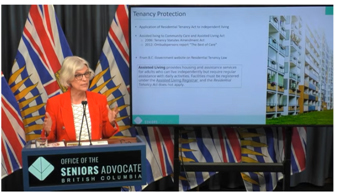
“Assisted living is an important option for seniors who want to remain independent but find managing a home difficult or want to live in a more social setting where they don’t have to prepare meals or do a lot of housework, and they know that help, when needed, is nearby,” said Mackenzie.
“However, we must act now to ensure assisted living units are available, safe and affordable for single seniors and couples who feel it is time to transition to a residential setting where they have more daily support,” said Mackenie.
Assisted living is not the same as long-term care which including a much higher level of supports including personal care.
CMHC data:
She noted that Canada Mortgage and Housing Corporation (CMHC) data is about two years old, showing:
- 20,656 independent living units in BC (2021)
- relative rate of growth over the last five years
“We don’t know what’s out there now,” says the BC Seniors Advocate, suggesting that current data will be needed as part of the BC government making any changes.
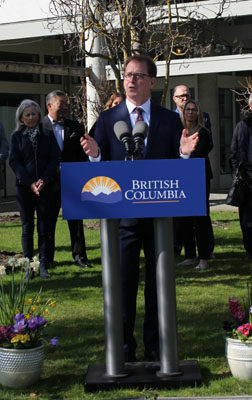
Mackenzie says that CMHC has usually generated an annual report of inventory.
Independent, assisted living & long-term care:
Three types of seniors accommodation in BC:
- 8,428 registered assisted living units in BC. Of those, 52% (4,415) are publicly subsidized and 48% (4,013) are private pay.
- The nearly 21,000 (20,656) independent living units in BC are almost all private pay.
- An estimated 29,200 long term care beds: 27,702 publicly subsidized and 1,500 private pay that are co-located with publicly subsidized.
Due to how the fee structures work, some lower-income seniors choose to go into long-term care (where meals, two meals a day, and social activities are provided) instead of assisted living (with minimal supports) which has less subsidy from the government.
Earlier this year, Health Minister Adrian Dix said that the majority of people (63.2%) living in long-term care have dementia, which is obviously more of a personal-care environment than many healthy seniors need. Long-term care facilities take time to plan, fund and build.
A new facility of long-term care beds and assisted living spaces will be coming to the west shore with completion in 2027 (located in Colwood). Minister Dix has announced other long-term care facilities to come in several BC locations in the past year or two.
Assisted living residences/units must be registered:
- In BC, an assisted living residence and unit(s) must be registered with the province under the Community Care and Assisted Living Act (CCALA).
- The requirement to register is met when the operator of the building provides assisted living services in addition to hospitality services.
- There is no requirement for the residence and unit(s) to be registered if the operator does not provide assisted living services. A tenant may hire an outside agency to support their personal assistance needs
- Assisted living sites may be operated directly by a health authority, by third party under contract to a health authority, by a fully private entity with no financial relationship with the health authority, or a combination of these.
Ministry of Health funding:
- The Ministry of Health provides funding for assisted living to each health authority as part of the budget to deliver home and community care services. In 2021/22, health authorities spent a total of $130.8 million on assisted living services. This amount has increased 60% over the past five years.
- In 2021/22, BC Housing provided $32 million towards assisted living, a 26% increase over the past five years.
Residential Tenancy Act covers assisted living:
“Our office hears regularly from seniors and their families about high rent and service fee increases and they are confused about their legal protections because they don’t know which provincial laws, if any, apply,” stated Mackenzie.
“Our review found that the public, operators and regulators need clarity regarding what services, oversight and protections apply for seniors in both assisted living and independent living. We know some independent living operators have been arguing their residents are not protected by either the Residential Tenancy Act or the Community Care and Assisted Living Act. This is wrong, and seniors in B.C. need to know that they cannot be compelled to sign away their tenancy rights which are protected by law.”
Increased demand:
The review also identified growing demand for publicly subsidized assisted living and noted the only increase in the past five years has been in private pay assisted living units.
Overall, the report noted a 15% decrease in the rate of publicly subsidized assisted living units per 1,000 of the target population 75+ over the past five years.
No increase in number of units:
“Despite a 52% funding increase for publicly subsidized assisted living over the past five years, there has been no increase in either the number of units available or service levels for existing residents,” said Mackenzie.
“The proportional waitlist for publicly subsidized assisted living is 50% higher than that of long-term care even though assisted living costs the health care system half as much as long-term care and is a fraction of the cost of acute care. We urgently need to provide more affordable assisted living for seniors who need it and divert some of our admissions to long-term care.”
Quality assurance:
In addition to issues related to tenancy protection and access, the report also addresses gaps in quality assurance.
“Currently there are no regulatory requirements for staffing levels or staff qualifications, and no requirement for annual inspections in assisted living in B.C. In the last year, less than half of the assisted living sites were inspected by the Assisted Living Registrar’s office. In addition to gaps in monitoring quality and safety, there is also no detailed accounting for money spent on publicly funded assisted living,” said Mackenzie.
Five recommendations:
The BC Seniors Advocate is recommending government take the following actions:
- Significantly increase the capacity of the publicly subsidized assisted living program with more units and expanded services, stating the demand is clear, and the cost effectiveness is compelling.
- Reduce the confusion that seniors and their family members experience as they navigate assisted living and other congregate living arrangements. The public, the operators and the regulators need to clearly know what is assisted living, what is not, and what services, oversight and protections apply to whom. Mixing different types of residency in one building will make it difficult to achieve this and consideration must be given to requiring all residents in a congregate setting to be under the same classification of tenancy.
- Provide explicit tenancy protection under the Residential Tenancy Act for all residents in all congregate living settings including assisted living.
- Address affordability issues in both publicly subsidized and private pay assisted living.
- Strengthen the effectiveness of current monitoring and enforcement systems as they relate to quality assurance, resident safety and value for investment in publicly subsidized assisted living.
===== RELATED:
260 long-term care beds for seniors coming to the west shore in 2027 (March 22, 2023)
Majority of seniors in long-term care have dementia, says Dix (March 22, 2023)



